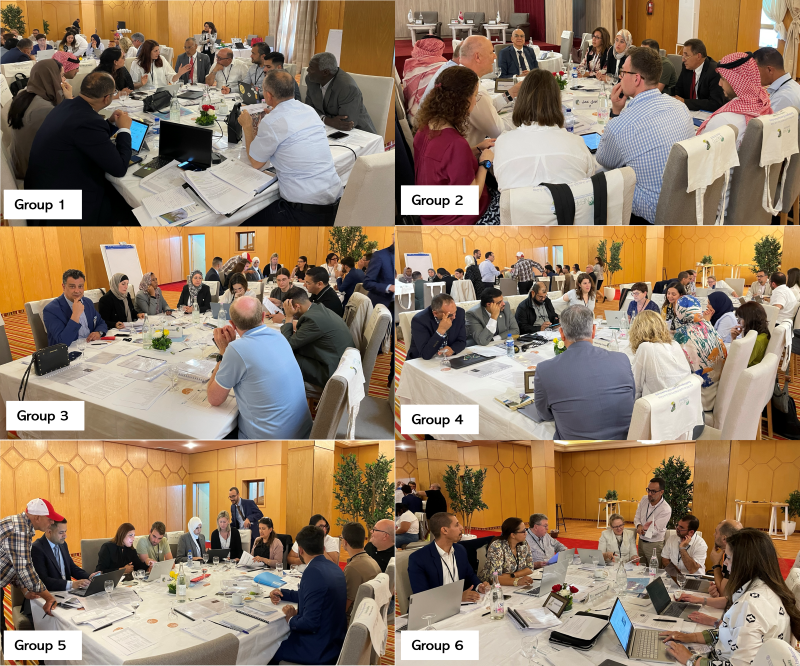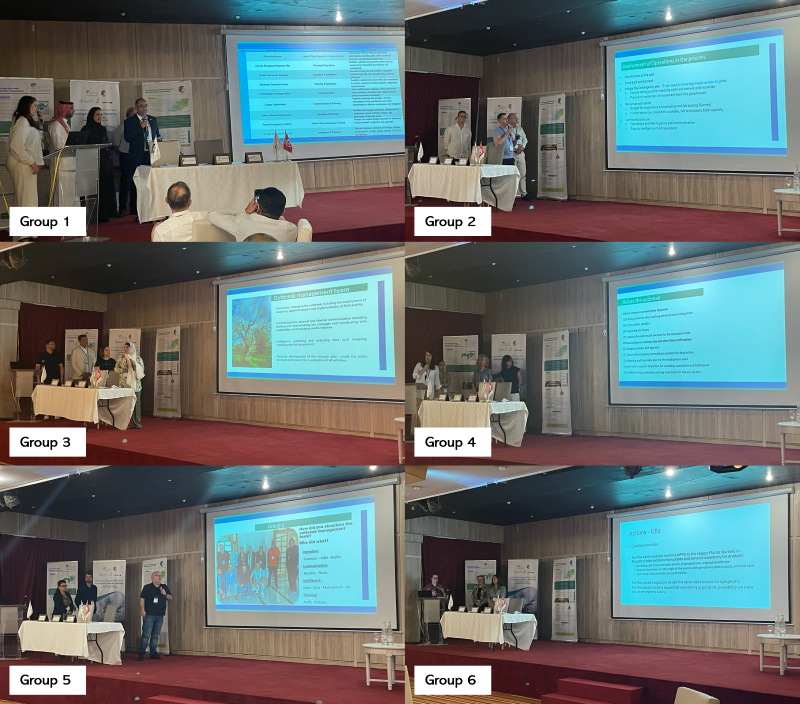
EPPO/NEPPO Contingency Exercise Workshop – Xylella fastidiosa
2025-05-26/28, Hammamet, Tunisia

An European and Mediterranean Plant Protection Organization (EPPO) / Near East Plant Protection Organization (NEPPO) contingency exercise workshop was organized in collaboration with the BeXyl (Beyond Xylella) project, EFSA, and the FAO. It was hosted in Tunisia and attended by 72 participants, including experts from National Plant Protection Organizations, plant health scientists, policy officials, inspectors, quarantine officers, pest control specialists, and other experts from 21 countries.
The objectives of the Workshop were to:
- Simulate the experience of a plant health emergency
- Experiment with emergency response procedures
- Test the availability and adequacy of existing contingency plans
- Evaluate the relevance of additional resources, such as EPPO guidance
- Provide hands-on experience in communicating key messages during an emergency
- Learn the purpose and process of developing contingency plans
- Learn how to carry out an emergency response exercise
- Foster cross-regional collaboration and knowledge exchange
Contingency Exercise
Participants were divided into six groups, each acting as an ‘Outbreak Management Team’ to address the challenges of a pest outbreak. The exercise followed a scenario of a fictitious outbreak of Xylella fastidiosa in an olive orchard in a fictitious country (Surveyland). As the contingency exercise developed, participants had to organize themselves to manage a number of issues designed to mimic the development of an outbreak.
Day 1
The workshop began with welcome addresses and opening speeches from:
- Ms Tikka, Director-General of EPPO
- Mr Ben Jamâa, Executive Director of NEPPO
- Mr Hochlef, Vice Minister of Agriculture, Water Resources, and Fisheries of Tunisia
Introductory presentations set the stage for the exercise, covering:
- Multi-partner collaborations: building resilience against pest outbreaks in the Mediterranean basin (Ms Tikka, EPPO)
- The approaches of NEPPO for the emerging pests in the Near East and North Africa (NENA) Region (Mr Ben Jamâa, NEPPO)
-
Contingency planning for pest outbreaks (Mr Tanner, EPPO)
- Contingency plan for Xylella fastidiosa: Tunisian case (Mr Ben Jamâa, NEPPO)
-
Scientific knowledge required for preparing contingency plans for Xylella fastidiosa (Mr Vos, European Food Safety Authority)
-
BeXyl Project: Beyond Xylella, Integrated Management Strategies for Mitigating Xylella fastidiosa impact in Europe (Mr Navas-Cortés, BeXyl)
Each group was supported by a facilitator:
- Group 1: Mr Triki (Olive Institute, TN)
- Group 2: Mr Vos (EFSA)
- Group 3: Ms Boukhris-Bouhachem (National Institute of Agronomic Research of Tunisia, TN)
- Group 4: Ms Jacques (Institute of Research in Horticulture and Seeds- National Research Institute for Agriculture, Food and Environment, FR)
- Group 5: Mr Aoutil (EPPO)
- Group 6: Mr Vicent (Valencian Institute of Agricultural Research, ES)

A demonstration of the RIPEST platform for determining sampling sizes was provided by EFSA. Presentations were also given on the biology and ecology, and vectors of Xylella fastidiosa:
-
Biology and Ecology of Xylella fastidiosa (Ms Jacques, IRHS-INRAE, FR)
-
Aphrophoridae candidate vectors of Xylella fastidiosa in Tunisia (Ms Boukhris-Bouhachem, INRAT, TN)
Each Outbreak Management Team worked through the exercise and responded to inputs based around the outbreak.
Day 2
On the second day, a field visit was organized to Sadira, a leading company in olive plant material production in Tunisia. This visit included:
- A visit to their nursery for production of olive seedlings
- A demonstration by Mr Vicent, Mr Adrover (Agriculture Service, Ministry of Agriculture, Fisheries and Food of the Balearic Government, ES), and Mr Madhioub (General Directorate of Plant Health and Control of Agricultural Inputs, TN) on sampling techniques for Xylella fastidiosa
- Field collection of insect vectors led by Ms Boukhris-Bouhachem

Participants visited the Plant Quarantine Laboratory (PQL) at the General Directorate of Plant Health and Control of Agricultural Inputs (Tunis). Demonstrations included:
- Sample reception and ELISA testing, presented by Ms Benammar (PQL, TN)
- DNA extraction and Real-Time PCR analysis, demonstrated by Ms Tarhouni (PQL, TN)
- Vector identification procedures, outlined by Ms Boukhris-Bouhachem

Day 3
On the final day, presentations were delivered on the economic impacts of Xylella fastidiosa in Europe and the NENA region:
-
Economic impacts of Xylella fastidiosa for Europe (Mr Vicent, IVIA, ES)
- Exploring the Socio-Economic Impacts of Xylella fastidiosa for the NENA Region (Mr Yaseen, Food and Agriculture Organization - Regional Office for the Near East and North Africa)
Each Outbreak Management Team completed the contingency exercise and delivered a presentation detailing:
- The approach followed during the simulation
- Feedback on a draft Tunisian contingency plan
- Feedback on the EPPO Standard PM 9/10 Generic elements for contingency plans

Conclusions
- This is the first collaborative Contingency Exercise Workshop between EPPO and NEPPO. It enabled participants from across the regions to communicate and exchange information and experiences on preparedness for pest outbreaks.
- All groups actively participated in the exercise, presenting structured approaches to mitigate a pest outbreak.
- Excellent feedback was received from each group on the draft Tunisian contingency plan and the EPPO Standard PM 9/10 Generic elements for contingency plans. This feedback will be used when considering future updates.
- EPPO will explore how to disseminate guidance through follow-up webinars (e.g. EPPO PM 3 Standards on Inspection for Xylella fastidiosa).
The EPPO Secretariat thanks NEPPO for co-organizing the workshop, the organizing committee, the facilitators for aiding group discussions, and all participants for their active contribution.
